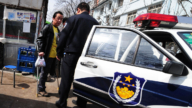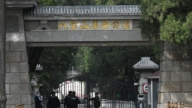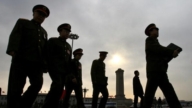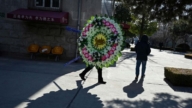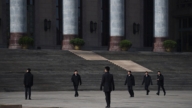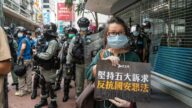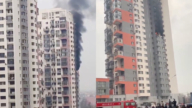【新唐人2015年01月12日訊】總部設在美國的人權組織「對話基金會」1月7號發表報告說,2013年中國共有2321人因為政治罪名被逮捕或起訴。民間維權人士證實,最近幾年當局的鎮壓力度空前,而國家機制的被破壞,已經讓幾乎每一個中國人,包括「加害者」,都可能利益受損。
「對話基金會」根據新近出版的《中國法律年鑑》的數據指出,2013年,中國有2321人以涉嫌「危害國家安全罪」而被逮捕或者起訴,政治罪名包括顛覆、分裂、煽動等等。這個數據僅次於西藏發生抗議事件的2008年。
這些人很多都是被秘密逮捕或起訴,只有31人的名字被公開,從發音看,包括藏族、維族和漢族人,其中一位是新疆維權人士趙海通。
「中國人權觀察」負責人秦永敏:「趙海通還算是一個相當活躍的人物。他從新疆出來,在外面做了一兩年,然後回新疆去,在新疆為維族人維權,後來被判了14年。判刑幾個月以後,(消息)才慢慢的輾轉流露出來。而且我們在當地有朋友,都想去看他,結果誰去看抓誰。」
「中國人權觀察」負責人秦永敏指出,很多不像趙海通那樣被外界知道的民間維權人士,在被秘密抓捕或判刑後,家人也受到威脅,不得向外界透露。在這種情況下,很多案例無法統計。
中共在97年修訂《刑法》時,將「反革命罪」修改為「危害國家安全罪」,並且仍然放在十類罪的第一位。維權人士指出,其實改變的只是名稱,而不是內核。
知名維權人士胡佳:「所謂『反革命罪』,其實就是『反黨』。現在來講的話,從97年之後,這個內核『反革命罪』,被包裝成了叫『危害國家安全』。其實中共從來沒有經過人民賦予它權力的過程,也就是它沒有經過真普選。所以說從頭至尾,從65年以前開始,它就沒有合法性的。」
「危害國家安全罪」以及一些相關罪名,現在已經成為當局鎮壓持不同政見者的一個主要罪名。維權人士指出,近兩年鎮壓力度空前。
知名維權人士胡佳:「2013是『聚眾擾亂公共秩序年』,2014變成了『尋釁滋事年』。其實這些所謂的普通人的罪名,也都涉及『危害國家安全』,也都被中共當作『危害國家』。其實就是危害它的黨的利益、黨的特權。」
秦永敏:「毫無疑問,這兩年抓的人,數量之大,是前所未有的,可能差不多是六四以來,數量最大的。」
秦永敏分析,這樣的大抓捕可能還會持續,原因是多方面的,除了當局鎮壓力度空前,另一方面原因,是經過30年市場經濟的發展,市民社會有相當大的成熟,社會利益衝突高度激化,中國幾乎每個人都難免利益受損,甚至包括「加害者」。
秦永敏:「就是包括我跟國保打交道,每一個國保,他們都能說出自己的一本難唸的經。每個人都有利益受損的時候,原因在於甚麼呢?在於今天的中國,它沒有一個公平的制度。現行的這些制度即使不公平,也沒辦法(要)執行。」
民間法律工作者李向陽指出,使國家機制腐敗到這一步的人,才是真正危害國家的人。
民間法律工作者李向陽:「要說煽動、顛覆或反對國家,應該是當前體制內從上到下的官員。他們踐踏國家法紀,製造社會矛盾,給社會帶來亂象。他們的所作所為恰恰是在顛覆這個國家,反對這個國家。」
李向陽認為,周永康、徐才厚、令計劃等官員,巨額貪腐,踐踏法紀,破壞國家和社會運行規則。而許多被當局以「危害國家安全」罪名抓捕的人,卻是為了中國的人權、法治在發聲的人士。
採訪/朱智善 編輯/尚燕 後製/肖顏
The Endangered “National" Security
The nonprofit humanitarian organization, Dui Hua, reported
on Jan. 7 that 2,321 people were faced with arrest and
indictment for the crime of “endangering state security" (ESS)
in 2013.
Activists confirmed that every Chinese, including
the perpetrators, are the victims of the unprecedented
suppression and the ruin of the state mechanism
by the Communist regime.
Statistics recently released in China Law Yearbook (CLY)
indicate that in 2013 indictments for the crime of ESS—
the category of crime that comprises subversion, splittism,
and their incitement, reached 2,321,
next to Tibetan protests in 2008, reported Dui Hua.
Of the hundreds of people who faced ESS charges in 2013,
only 31 made it into Dui Hua’s Political Prisoner Database
for lack of transparency.
Included are Tibetans, Uyghurs and Han Chinese.
Zhao Haitong, an activist from Xinjiang was also included.
Human Rights Watch chairman Qin Yongmin: “Zhao Haitong,
a native of Xinjiang, is quite popular.
He worked outside of Xinjiang for a couple of years.
He defended for the human rights of the Uyghurs after he
returned to Xinjiang but was sentenced to 14 years in prison.
The sentencing was not known until several months later
through various channels.
We have friends at local who would visit him in the prison,
but were only arrested as well."
Qin Yongmin commented that many activists not so well
known to outsiders were also arrested and indicted.
Many cases have been hidden due to their families being
warned not to disclose the facts.
The 1997 revised Criminal Law included the crime of
endangering national security which was based on
crimes of counter-revolution.
However, it is simply a change of title, not content,
according to activist Hu Jia.
Hu Jia: “The so-called crimes of counter-revolution are
in fact ‘anti-party’.
Since 1997, the essence of crimes of counter-revolution
was repackaged with a new title,
‘endangering national security.’
The Chinese Communist Party was never empowered
by the people, it is not legal.
That means the CCP has never been legal
since 65 years ago."
Crimes of endangering national security and a number
of related charges have been manipulated by the regime
to suppress dissidents, and resulted in unprecedented
repression in China in recent years, said Hu Jia.
Hu Jia: “2013 was the year of ‘assembling a crowd to disturb
order at public places’.
2014 became the year of ‘picking quarrels and provoking
troubles’.
These ordinary charges have also been manipulated
by the CCP as part of ‘endangering’ state security.
In fact, it indicates endangering the interests and privilege
of the party."
Qin Yongmin: “The number of arrests has been
unprecedentedly large in these two years and probably
the largest since 1989. There is no doubt about it."
Qin Yongmin analyzes such a large scale of arrests is likely
to continue for many reasons.
On top of the unprecedented crackdown, there is also
the reason that after 30 years of market economy
development, the degree of maturation of civil society
has intensified the conflict of social benefits.
Almost everyone in China, including the perpetrators,
is inevitably faced with the violation of interests."
Qin Yongmin: “Even the national security staff were
complaining when I was interacting with them.
Everyone has his share of difficulties.
The reason for that is the lack of a fair system in China
today. This unfair system is still being executed."
Human rights lawyer Li Xiangyang indicates that those
corrupt officials who ruined the national mechanisms
are the ones endangering national security.
Li Xiangyang: “All of the officials within the system are
the ones who truly incite, subvert, and oppose the nation.
They have trampled national law, created social conflicts,
and brought chaos to society.
What they have done are exactly subverting
and opposing the nation."
Li Xiangyang indicates, officials such as Zhou Yongkang,
Xu Caihou and Ling Jihua have undermined
the operating rules of the nation and society
through their massive corruption and violation of the law.
Those who were arrested on charges of endangering state
security are rather the people who speak on behalf of
human rights and the rule of law in China.
Interview/Zhu Zhishan Edit/ShangYan Post-Production/XiaoYan


